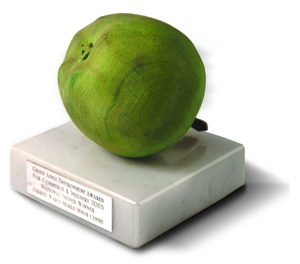The National Green Apple Awards for Environmental Best Practice


Awarded on behalf of the Green Organisation to Charles Ware's Morris Minor Centre Ltd.
"In recognition of the part they have played in improving global knowledge of environmental best practice by having their award-winning paper published in The International Green Book 2004"
Awarded at the House Of Commons, London on 6th November 2003 - The award was presented to Charles Ware by Patricia Hewitt Minister for Trade and Industry.
Our philosophy and practice of Durable Car ownership over the last 30 years shows that by following our programme a Morris Minor is cheaper to own and uses a fraction of the resources consumed during the life cycle of a modern car. A Morris Minor is logically the greenest car on the planet. The synopsis of our radical submission for the award...
Durable Car Ownership project aim and achievements:
We can demonstrate that labour intensive manufacturing and maintenance offers the consumer many financial and environmental advantages over automated mass produced modern car ownership.
Energy and natural resources. A durable car consumes about 20% of the resources used in modern car production.
Financial depreciation. A durable car might depreciate by 10% over ten years. A modern car 85% over the same period.
Employment. Labour intensive manufacturing maximises the use of skilled labour. Modern automated manufacturing systems minimise the use of labour.
Running costs
Owning a durable car costs at least 30% less overall than running its modern equivalent. For more up to date information please go to Julian Marshall's article in How Big Is Your Carbon Footprint in Minor Matters 2009. He also has done a direct comparison with the modern Mini. You can look at this on the North Wilts MMOC website
http://www.northwiltsmmoc.co.uk/styled-3/index.html
Economic benefits
Our labour intensive joint Sri Lanka/UK manufacturing company is cost effective and economically beneficial to this developing country. The submission backed by the following information shows the logical benefits of Durable over modern mass production methods.
Energy and resources
The components for durable and modern cars use the same level of energy and resources in their production but during the minimum 40 years life of a durable car, 3 or 4 modern cars will have been scrapped. A waste of resources. In the assembly process, a durable car is put together by simple hands-on jigs, using very little non - human energy. The modern automated manufacturing and assembly process is largely dependent on the high use of energy and is continually re - inventing itself. A waste of energy.
Financial depreciation
The speed of the financial depreciation cycle determines the useful economic life of a modern mass produced car. The constant fashion driven research and development programmes that automated production needs are so capital intensive that high volume production is vital to maintain manufacturers profitability. For some years, real demand for new cars has been saturated, so in order to keep production levels as high as possible, the bottom end replacement market has been accelerated through a lethal combination of financial depreciation value engineering and fashion. Cars are now better made but value engineering (planned obsolescence) is still an essential part of the life span of a car. Why make long - life components when the useful economic life of a car is 10 to 12 years and its value has fallen by 85%. A minor accident or component failure costing more than the value of the car leads to its junking. Fashion now dominates the marketing and manufacturing of cars and the constant updating of the latest model ensures that a relatively new model is undesirable in a very short time. The pressure on the consumer to constantly trade upwards is built into the process and the length of the car's life is as short as the market place will accept. The result of this throwaway philosophy is that the consumer is obliged to pay the high costs of financial depreciation, which over a life - time of motoring is substantial. A house is durable and over the long term will always deliver a tax free capital gain. Owning a modern car over a lifetime is a constant negative financial drain on its owners tax paid income, in many cases, wiping out that capital gain usually achieved through home ownership.
Employment
Modern automated electronic manufacturing is designed to reduce labour to a minimum. Durable systems create the use of skilled labour on a maximum scale. The cost of creating a new job in modern capital intensive manufacturing is very high. Labour intensive jobs in Durable manufacturing can be created on a huge scale, at low cost, because the skills used are manually intelligent and have been proven over the centuries. They give its workers pride and satisfaction in their jobs and skills, which is socially and economically desirable.
Sri Lanka
Using the relative values of the pound and the rupee, a panel, which would normally take a few minutes to make on a modern press in the UK can be manually formed in Sri Lanka in four hours and still allows the part to be viable commercially in the UK, whilst creating well paid skilled jobs in Sri Lanka. These jobs do not threaten UK employment. The total annual production of our 15 workers could be stamped out by 2 to 3 people in the UK. The benefit to Sri Lanka's economy is that each skilled worker supports on average 10 - 15 dependents.
Summary
Our industrial model, based on the continuing empirical history of the Morris Minor is of course transferable. A new durable car could be easily manufactured by a large company, at relatively low cost. We know, from our modest experiment, that a very large cross section of motorists really want to own a long term car, with known running costs. What could happen if industrial models like ours are properly considered, is that small durable production systems could be developed in parallel, to counter mass manufacturing's profligate use of energy and natural resources. Of course, in the near future the likelihood of changing the direction of this juggernaut is nil. In the meantime, this throwaway culture is taking its toll on our environment.

 The Green Apple Award
The Green Apple Award







